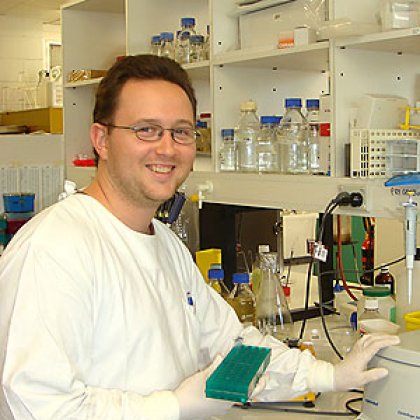
A University of Queensland postgraduate student award that comes as the direct result of an occasional glass of beer or wine, a barbecue, a back deck and a good chin wag between neighbours, has been awarded this year for the first time.
The Rodger Dallas Morgan Postgraduate Research Travel Award has been awarded to PhD student David Muller for his research on a protein involved in dengue fever infection.
"The award provides conference travel funding for a latter stage virology PhD candidate enrolled in the School of Chemistry and Molecular Biosciences," 27-year-old Mr Muller said.
"It’s an opportunity to present my work to an international audience that I otherwise wouldn't have had."
What sets this award apart from the myriad of others is the way it came into being – a generous bequest from Rodger Morgan in his will to his next door neighbour and good mate, Paul Young.
As it turns out, Paul Young is a Professor in virology at UQ and one of the world’s leading authorities on dengue fever.
"I first met Rodger in 1997 when he moved into the house next to us in Ashgrove. His enthusiasm for life was contagious and we soon became friends," Professor Young said.
"An electrician by trade, he had a natural ability to turn his hands to most things practical – a talent he shared when the need arose!
"After retiring as an electrician he worked as a janitor, gardener and handyman at a number of different Schools in Brisbane's West
"Rodger was also remarkably well read, with particular passion for Australian poetry.
"We shared many an afternoon or evening on our back decks with beers in hand, discussing a wide range of topics over the barbecue."
Professor Young said it was during these long afternoons that his neighbour became fascinated with the research he was conducting in the lab at UQ, looking at ways to combat dengue fever.
“Dengue is a global scourge, particularly in many developing countries within the tropics, and an increasing problem in northern Queensland," he said.
"Rodger’s standard comment whenever we saw each other was, 'made any breakthroughs lately?'," Professor Young said.
And it's becoming increasingly evident that some form of breakthrough is needed.
In its most recent estimation, the World Health Organization (WHO) said 2.5 billion people were at risk from dengue – that’s two fifths of the world's current population.
And, according to the WHO, the only way to currently prevent dengue virus transmission is to combat the disease-carrying mosquitoes.
But it's not just developing countries that have to worry. As of the end of May, Queensland Health figures show there have been almost 950 confirmed cases of dengue in north Queensland since December last year.
David Muller's PhD research is focusing on a particular viral protein, called NS1, found in the blood of people infected with dengue virus.
One of the goals of his research is to better understand the timing of its appearance during the course of the disease, information that’s been crucial in the development and application of better diagnostics.
"A rapid diagnostic assay based on work from our laboratory is currently being used across the world to provide early diagnosis of dengue infection," Mr Muller said.
In the year before his death from cancer, on a trip through South East Asia, Rodger Morgan experienced first hand the devastating effects that disease in all its forms can have on the community, particularly young children.
Professor Young said this experience left a lasting impression on his good mate, and galvanized him to help do something about it.
"He had a natural affinity for children and they with him. He had no children of his own but many, including my two daughters, were the grateful recipients of the time he devoted them," Professor Young said.
When Mr Morgan died of cancer, it came as a surprise to everyone – especially Professor Young – that he had left such a substantial bequest to his neighbour with no instructions, other than it was to be targeted towards his research.
"Typical of Rodger, it wasn't done with any fuss but with a great deal of feeling," Professor Young said.
Wanting to get the most out of the bequest, and in line with Rodger’s own lifetime commitment to encouraging and mentoring his young charges, Professor Young asked the University to put the money into a trust that would support the $2000 annual prize – created in honour of his bighearted neighbour – for many years to come.
Professor Young said it was difficult for PhD students to find the money to travel overseas and present their work at international conferences; the award providing exceptional students with that chance.
"This way we will be able to support PhD students in virology with much needed travel money, helping to build the numbers on the ground trying to solve these infectious disease problems."
Mr Muller plans to use the funds from the award to travel to the 4th Asian Dengue Research Network Meeting, held from December 8 to 11 in Singapore.
"This is a fantastic opportunity for me and I'm thrilled to be able to present my work at an international conference," he said.
"It also gives me the chance to see where dengue research is heading in the future and how I can become a part of that."
Media: Professor Paul Young (07 3365 4646) or Travis Taylor (07 3365 8598).
.jpg)


